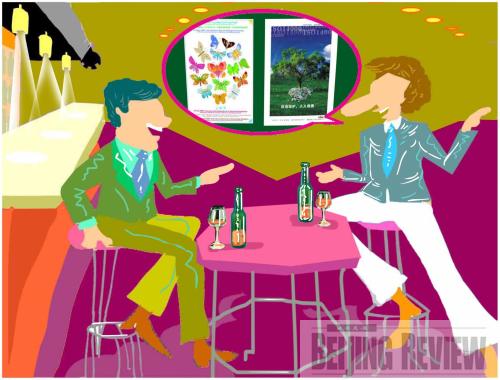|
 |
|
(LI SHIGONG) |
You'd never run out of green networking opportunities in Beijing. Thankfully, mixes of expats and locals have wrapped environmentalism and socializing into one package of discounted drinks and offbeat venues.
Like Green Drinks. At a recent session of the monthly informal get-together, I and about 60 others got to sip house wines at the Bookworm in Sanlitun for 30 yuan ($4.3) a glass—a significant discount—while taking the chance to talk to all kinds of fellow green-minded folks. It was a rare mix: from state broadcaster CCTV's English-language weatherman to a local physics professor explaining to me why he left his professorship to start Beijing's first vegan restaurant.
Then there was a larger wedge of locals, mostly male and all well dressed. "Carbon trader"—most of their name cards said. That is they act as agents to buy Certified Emission Reductions (CERs), the vouchers you get for cutting harmful emissions in China and other developing lands under the Kyoto Protocol. It's a way for developed countries to offset their own emissions—by cutting gases or pollution in China.
The logic of the scheme is that poorer countries get environment-friendly technologies they otherwise wouldn't afford. I'm not sure if the carbon traders at Green Drinks were there to expand their green vocabulary or for business opportunities: few among the NGO, diplomats and journalists present are likely to be in the market for CERs.
Or maybe they just have more time on their hands. The past six months proved a cold spell for carbon offsetting, as funds dried up and go-slow manufacturing businesses in the West became less polluting.
More time then for networking, and for explaining and thinking about the whole Clean Development Mechanism (CDM)—CER system, the most serious attempt so far to halt global warming but one with serious flaws. A lot of the suits who go to events like Green Drinks are not environmentalists, I learned. They're in the green business because, just as in stocks, there's money to be made buying Chinese CERs and selling them on at a profit.
The global turn down and falling oil prices has sucked investment away from badly needed carbon-cutting projects. Needing those projects the most, China is now suffering from a drought of cash needed to clean up its coalmines and power plants.
But most people I met at Green Drinks think the CDM scene has a bright future in China. And it's not simply about CDMs, there's a whole forest of green businesses in China. One green-drinker still investing here, Andre Loesekrug-Pietri, a director at CEL Partners gathers European cash for Chinese firms producing green technologies like solar panels. He told me there's still enough interest in Chinese firms making solar panels to make deals worthwhile.
A bona fide green expert, Loesekrug-Pietri has also looked at Chinese projects producing biofuel and collecting coal bed methane (a particularly poisonous gas that can be used for fuel if properly tapped). The prospect of food shortages makes biofuels difficult in China. Solar energy however is a sure bet for liquified petroleum gas because solar panels are set to "go down the cost curve soon," Solar power has great acceptance among the population, especially in remote, off-the-grid villages in China, which heat their water and homes from solar power.
Green Drinks is the best but not the only night out for green-minded business people and environmentalists. Greening the Beige is another, less frequent event. Then there's the German-Sino architecture firm, which infrequently hosts talks on issues like Beijing's chronic water shortages.
A problem with the networking events I've been to is that everything is in English. It's not guaranteed that the locals who need to learn about environmental issues can be persuaded to come to the event given the English medium and the location at an expat bar. That's a shame, because anyone with a green drink in their hand will tell you that international cash and talent is needed to bring green technologies China badly needs. Let's have more green networking then.
I hope that besides Green Drinks there's a proliferation of gatherings and talks, run by and moderated in Chinese. I'm going to look for some soon. The keenest, and most informed, questioners at various green events I've been to in Beijing have been locals.
And then there's the green networker, a European in Beijing, who says he only goes because the interns working in environmental organizations tend to be cute. As good a reason as biofuels and wastewater solutions maybe. I for one am looking forward to more green nights out in Beijing.
The author is Irish and lives in Beijing | 